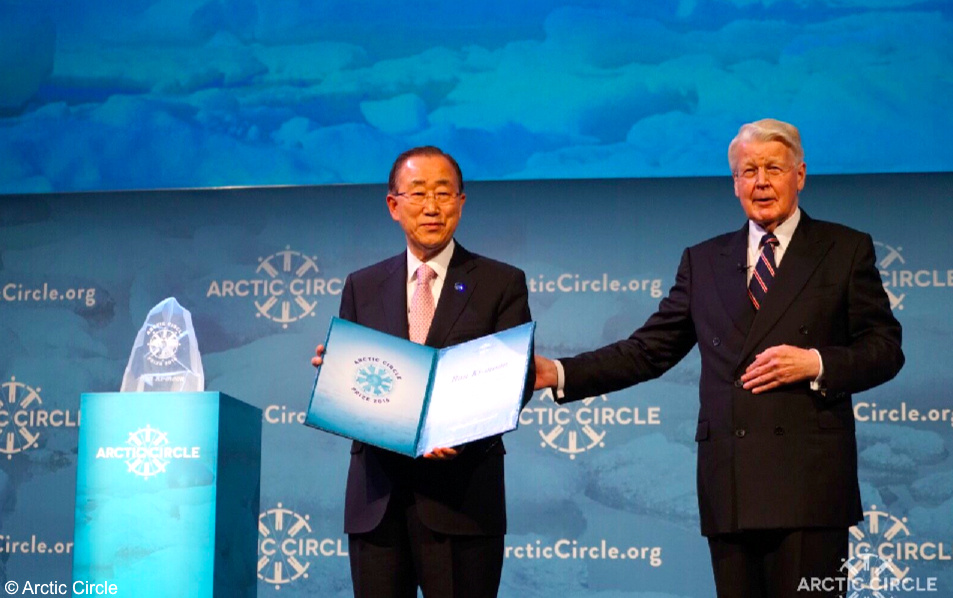Participants from over 40 countries at the Arctic Circle Assembly
The Arctic Circle Prize was awarded for the first time at the Arctic Circle Assembly on 8th October in Reykjavík’s Harpa Conference Center. Arctic Circle Chairman Ólafur Ragnar Grímsson (President of Iceland 1996-2016) awarded the Prize to Ban Ki-moon, Secretary-General of the United Nations, in recognition of his leadership in international climate diplomacy, which Mr. Grímsson described as “an act of extraordinary statesmanship, courage and vision” given political opposition at the time he took up his mandate.

The Prize, Mr. Grímsson said, was intended in order to honor “individuals, institutions, or associations whose work has been of critical importance to the future of the Arctic.” The decision to award the Prize to Ban Ki-moon was attributed to the Secretary-General’s key role in the success of the COP21 Paris Climate negotiations, which Mr. Grímsson described as “a shining example of his unique personal commitment and the best endeavors of the United Nations.”
On the stage of Harpa Conference Center’s Silfurberg Hall, Mr. Grímsson presented the Secretary-General with a testimonial document for the award bound in Icelandic salmon skin, symbolizing the dependence of the world’s ocean food systems on a stable climate, together with a glass sculpture by Icelandic artist Sigrún Ólöf Einarsdóttir evocative of glacial ice.
The Arctic Circle Prize was established in recognition of the importance of “acknowledging the greatest contributions to our common challenges,” Mr. Grímsson said, and the decision to award the Prize to Ban Ki-moon was made because “without the success of a global agreement on the climate, the Arctic would be in great peril.”
The ceremony took place one year after President François Hollande of France urged world leaders at the 2015 Arctic Circle Assembly to strengthen their commitments to an accord at the 2015 United Nations Climate Change Conference (COP21). The awarding of the Prize this year acknowledged the Secretary-General’s work in “bringing the nations of the world together in a comprehensive climate agreement.”
Upon accepting the Prize, the Secretary-General acknowledged his own efforts in climate negotiations, but emphasized the important contributions from governmental and civil society leaders, whom, he argued, deserved to share the prize with him. He accepted the prize “on behalf of tens of thousands of dedicated leaders” in “business, civil society, and NGOs” who have worked with the United Nations in the climate change endeavors. “I represent only a small segment of that effort.”
Mr. Ban did not deny that the Paris Agreement was indeed groundbreaking, noting that the ratification of the Paris Agreement marked “record-breaking” ratification numbers, with 191 countries having ratified the agreement. The Paris Agreement broke the previous record-holding agreement on the United Nations Convention of the Law of the Sea (UNCLOS).
Still, despite the politically historical success of the Paris Agreement, Mr. Ban stressed that it was time to “turn our words into deeds” in reducing emissions, and that it was additionally necessary to find “financial resources to help developing countries” mitigate climate effects. Calling attention to the urgency of such action, Mr. Ban quipped, “There is no Plan B because we do not have a Planet B.”
“The Arctic is Ground Zero for climate change,” the Secretary-General stated, mentioning the many geophysical changes currently in process in the Arctic as a result of climate change, including the melting of sea and land ice, as well as especially permafrost thaw, which threatens to create a feedback loop of warming from the further release of ground methane.
Among various political and business actions necessary for continued momentum in combating climate change, The Secretary-General made particular mention of the “centuries-old wisdom” of indigenous Arctic peoples, which he considered vital for the future of well-being of Arctic societies, as well as non- indigenous communities.
The Secretary-General thanked former President Grímsson, as well as Prime Minister Sigurður Ingi Jóhannsson and Minister for Foreign Affairs Lilja Dögg Alfréðsdóttir, for the invitation to Iceland.
Participants from more than 40 countries were present in Harpa on the day of the ceremony, including ministers and political representatives from numerous countries, directors of scientific research institutions and international environmental organizations, as well as leaders of indigenous associations and businesses. In total, the Assembly program lists more than 400 speakers taking part in over 90 sessions.
For further information, contact the Arctic Circle Secretariat at , Sigríður Blöndal at , or Takeshi Kaji at .
